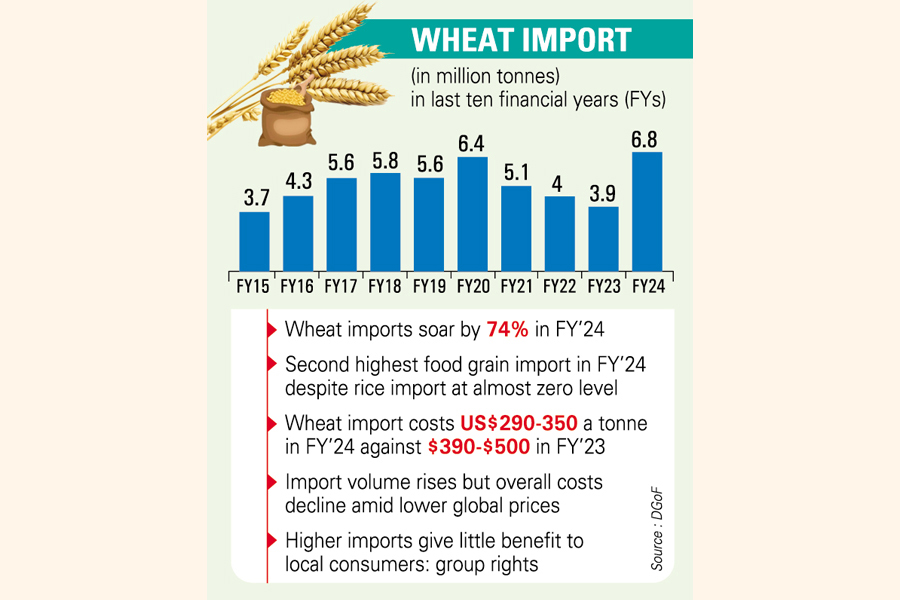Drop in global wheat prices spurs record imports in FY24
Weaker Taka, costlier gas undo retail price benefit

Published :
Updated :

Wheat imports surged to an all-time high in the just-ended financial year to 6.8 million tonnes, buoyed by a combination of lower international prices and increased demand from local food processors, according to industry insiders.
Wheat arrivals jumped by more than 74 per cent year-on-year in FY2023-24, with the private sector accounting for over 88 per cent of imports, according to the Directorate General of Food under the Ministry of Food.
In FY24, total food grain -- wheat and rice together -- arrivals were the second-highest on record followed by the all-time high of 9.7 million tonnes in FY18. However, rice imports in FY24 were negligible, according to the food ministry.
Consumer rights activists argue that this large volume of wheat imports has offered little benefit to people. Prices of wheat flour and flour-based products have seen only a small reduction compared to the remarkable drop in international wheat prices.
Preferred not to be named, an official at the procurement division of the food directorate said the decline in global wheat prices to a two-year low in FY24 encouraged traders to import such a large quantity.
He said the directorate itself procured 12 per cent, roughly 0.8 million tonnes, of the total amount. Wheat prices rose in mid-June but then fell back to their previous levels in July.
SM Nazer Hossain, vice president of the Consumers Association of Bangladesh, said the global decline in food prices had barely benefited consumers in Bangladesh.
He said non-brand flour prices declined by Tk 5.0 a kg against the import price drop of Tk 12-14 a kg in FY24.
Branded packet flour saw a minimal decline during this period, with packet maida still selling at Tk 72-75 per kg and atta at Tk 63-65 per kg.
Shafiul Ather Taslim, director of TK Group, the parent company of the brand 'Pushti', said his company's wheat imports increased by "a good margin" in FY24 compared to the previous year.
Despite the ongoing war in Europe, sourcing wheat was easier in FY24 as global prices were slightly lower, he said. "But, soaring gas prices at factories and the devaluation of the local currency Taka against the US dollar have made trading more challenging."
He said the import cost per tonne remained between $280 and $350 in FY24, but the value of one dollar rose to Tk 120, compared to Tk 85-95 in FY23.
Gas prices per unit surged to Tk 30, which was previously Tk 10, increasing the operating costs, he added.
Despite these cost increases, all companies have reduced wheat flour prices by more than 20 per cent, said Mr Taslim.
Biswajit Saha, director of City Group, said his company could only import 60 per cent of its wheat target due to the dollar crisis throughout the year.
"We adjusted the price of a 50kg sack of finer flour [maida] to Tk 2,500-2,600 at the mill gate in FY24, down from Tk 2,800-2,900 in FY23," he said.
The price of coarse flour is now Tk 1,700 per sack, down from Tk 1,900 in FY23, he added.
The Directorate General of Food said public warehouses currently hold 1.4 million tonnes of grain, with wheat accounting for 0.4 million tonnes.
In its April report, the US Department of Agriculture (USDA) forecast Bangladesh's wheat imports to be higher at 6.2 million tonnes in the current financial year FY25.
Earlier, the USDA predicted Bangladesh's wheat imports to be 6.0 million tonnes for FY24, when the actual figure reached a record high of 6.8 million tonnes.
Bangladesh produces 1.0-1.1 million tonnes of wheat annually, which meets only a fraction of its demand of 7.0-7.5 million tonnes, according to the agriculture and commerce ministry estimates.
tonmoy.wardad@gmail.com


 For all latest news, follow The Financial Express Google News channel.
For all latest news, follow The Financial Express Google News channel.